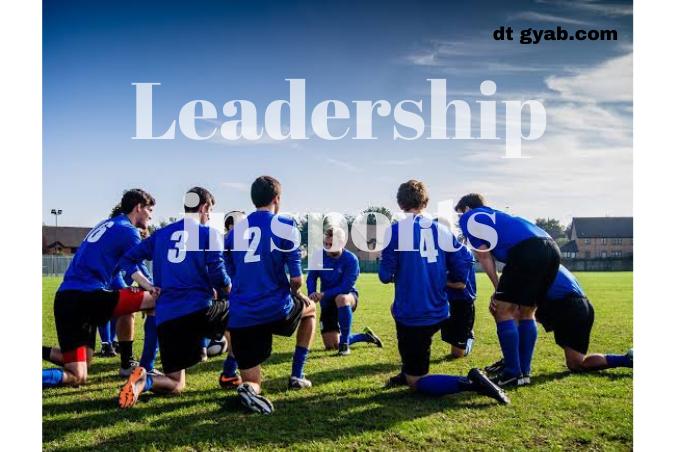
The Role of Sports in Building Character and Leadership
Introduction
Sports contribute to physical health and play a crucial role in shaping individuals’ The Role of Sports in Building Character and Leadership abilities. The values learned through sports, such as teamwork, discipline, and perseverance, extend far beyond the playing field, influencing various aspects of life. Moreover, sports offer opportunities for personal growth, social integration, and the development of essential life skills.
Sports as a Tool for Social Integration
Sports have a remarkable ability to bring people together, transcending cultural, social, and economic differences. Whether it’s a local community team or an international sporting event, the shared passion for sports unites individuals from diverse backgrounds. Participating in sports teaches individuals to collaborate, communicate effectively, and respect others, regardless of their differences.
Breaking Down Barriers and Fostering Inclusivity
In many communities, sports serve as a common ground where people of all ages, genders, and ethnicities can come together and interact on equal footing. Stereotypes and prejudices can be challenged and dismantled through sports, fostering a sense of inclusivity and acceptance. Whether playing on the same team or cheering for a favorite athlete, sports create shared experiences that bridge divides and promote unity.
Building Stronger Communities
Sports can strengthen the fabric of communities by providing opportunities for people to connect, engage, and collaborate. Local sports leagues, events, and tournaments bring neighbors together, fostering a sense of belonging and pride in the community. Additionally, sports facilities, such as parks and recreation centers, serve as gathering places where individuals can interact and build relationships beyond organized sports.
Promoting Cultural Understanding and Respect
Through sports, individuals gain exposure to different cultures, traditions, and perspectives, fostering greater understanding and respect for diversity. Whether it’s learning about the history of a sport, experiencing the customs of a foreign team, or competing against athletes from other countries, sports provide valuable opportunities for cultural exchange and dialogue. By embracing diversity within sports, individuals can cultivate empathy, tolerance, and appreciation for the richness of human experience.
Overcoming Challenges and Adversities
In addition to promoting social integration, sports teach individuals valuable lessons about resilience, perseverance, and overcoming obstacles. Whether facing a formidable opponent, recovering from an injury, or bouncing back from a defeat, athletes learn to confront challenges head-on and emerge more robust and resilient. These experiences build character, instilling a sense of grit and determination that can be applied to any aspect of life.
Dealing with Failure and Learning from Mistakes
One of the most valuable lessons sports teach is coping with failure and learning from mistakes. In sports, setbacks and losses are inevitable, but how individuals respond to these challenges defines their character. By experiencing failure firsthand, athletes develop resilience, adaptability, and a growth mindset. They learn to embrace failure as an opportunity for growth and improvement rather than a deterrent to success.
Handling Pressure and Performing Under Stress
Sports often involve high-pressure situations where athletes must perform at their best under intense scrutiny and competition. Whether it’s a crucial game-winning shot or a decisive match point, athletes must learn to manage their emotions, stay focused, and perform under pressure. These experiences build mental toughness, composure, and the ability to thrive in stressful situations, skills that are invaluable both on and off the field.
Influencing Positive Role Models
Coaches have a unique opportunity to influence athletes positively and serve as role models for sportsmanship, integrity, and ethical conduct. By demonstrating respect for opponents, officials, and teammates, coaches set a standard of behavior that athletes aspire to emulate. Moreover, coaches instill values such as hard work, perseverance, and dedication, inspiring athletes to strive for excellence in all aspects of their lives.
Providing Guidance and Support
In addition to technical instruction, coaches provide athletes with guidance, support, and encouragement throughout their sporting journey. Whether they offer words of wisdom before a big game, constructive feedback after a loss, or a shoulder to lean on during difficult times, coaches play a crucial role in athletes’ personal and emotional development. By fostering a supportive and nurturing environment, coaches empower athletes to reach their full potential on and off the field.
Mentoring Beyond the Field
Beyond the realm of sports, coaches serve as mentors and advocates for athletes, helping them navigate the challenges of adolescence and prepare for life beyond the playing field. Through mentorship programs, leadership workshops, and one-on-one counseling, coaches provide athletes with valuable life skills such as goal setting, decision-making, and conflict resolution. Moreover, coaches serve as advocates for athletes, helping them access resources, opportunities, and support networks that can enhance their personal and academic success.
The Impact of Sports on Academic Performance
Contrary to popular belief, participation in sports can positively impact academic performance. Sports teach valuable skills such as time management, discipline, and goal setting, which are essential for academic success. Moreover, the physical activity associated with sports has been shown to improve cognitive function, concentration, and memory, leading to better academic performance in the classroom.
Balancing Sports and Academic Responsibilities
While the demands of sports can be time-consuming, athletes learn to balance their athletic commitments with their academic responsibilities. By prioritizing their time, setting realistic goals, and managing their schedules effectively, athletes develop essential time management skills that serve them well in all aspects of life. Moreover, sports participation teaches athletes the importance of discipline, perseverance, and hard work, which are essential for academic success.
Enhancing Cognitive Skills and Academic Achievement
Engaging in regular physical activity has been shown to improve cognitive function, enhance brain health, and boost academic achievement. Exercise increases blood flow to the brain, stimulates the release of neurotransmitters such as dopamine and serotonin, and promotes the growth of new brain cells, all of which contribute to improved learning, memory, and problem-solving skills. Moreover, the social interaction, teamwork, and camaraderie associated with sports promote emotional well-being and reduce stress, creating a conducive learning and academic success environment.
Sports as a Lifelong Pursuit
One of the most remarkable aspects of sports is their potential to become a lifelong pursuit, enriching individuals’ lives well beyond their competitive years. Whether it’s through recreational leagues, amateur tournaments, or simply staying active for health and enjoyment, sports offer endless opportunities for personal growth, social connection, and physical well-being.
Instilling a Love for Physical Activity
Participating in sports from a young age instills a love for physical activity that can last a lifetime. By introducing children to a variety of sports and activities, parents and coaches lay the foundation for a healthy and active lifestyle that extends into adulthood. Moreover, the camaraderie, competition, and sense of achievement associated with sports create positive associations that motivate individuals to stay active and engaged throughout their lives.
Maintaining a Healthy Lifestyle
Regular participation in sports is associated with numerous health benefits, including reduced risk of chronic diseases such as obesity, diabetes, and heart disease. By staying active and physically fit, individuals can enjoy improved overall health, enhanced quality of life, and increased longevity. Moreover, the discipline and habits learned through sports, such as proper nutrition, hydration, and rest, contribute to a balanced and healthy lifestyle that promotes well-being in all areas of life.
Continuing Personal Growth and Development
Beyond the physical benefits, sports offer ongoing personal growth and development opportunities. Whether it’s setting new goals, challenging oneself to improve, or learning from experiences both wins and losses, sports provide a dynamic platform for self-discovery and self-improvement. Moreover, the friendships, mentorships, and support networks formed through sports provide valuable sources of encouragement, inspiration, and accountability, fostering continuous growth and development throughout life.
Conclusion
sports’ role in building character and leadership is multifaceted and profound. From fostering essential values such as teamwork, discipline, and sportsmanship to providing opportunities for personal growth, social integration, and lifelong learning, sports have a transformative impact on individuals’ lives. By recognizing and harnessing the power of sports, we can empower individuals to become better athletes and better leaders, citizens, and contributors to society.



